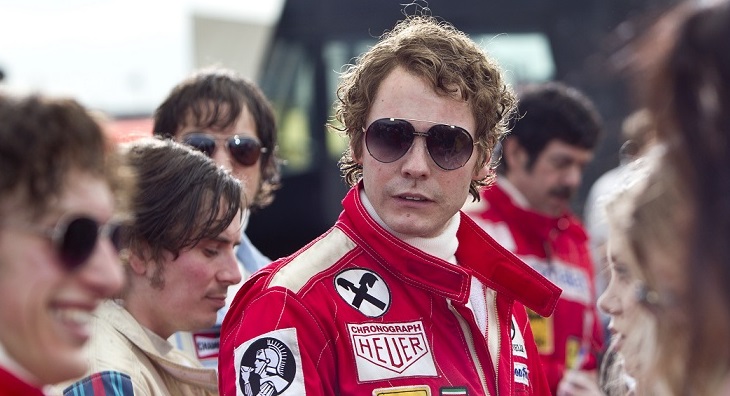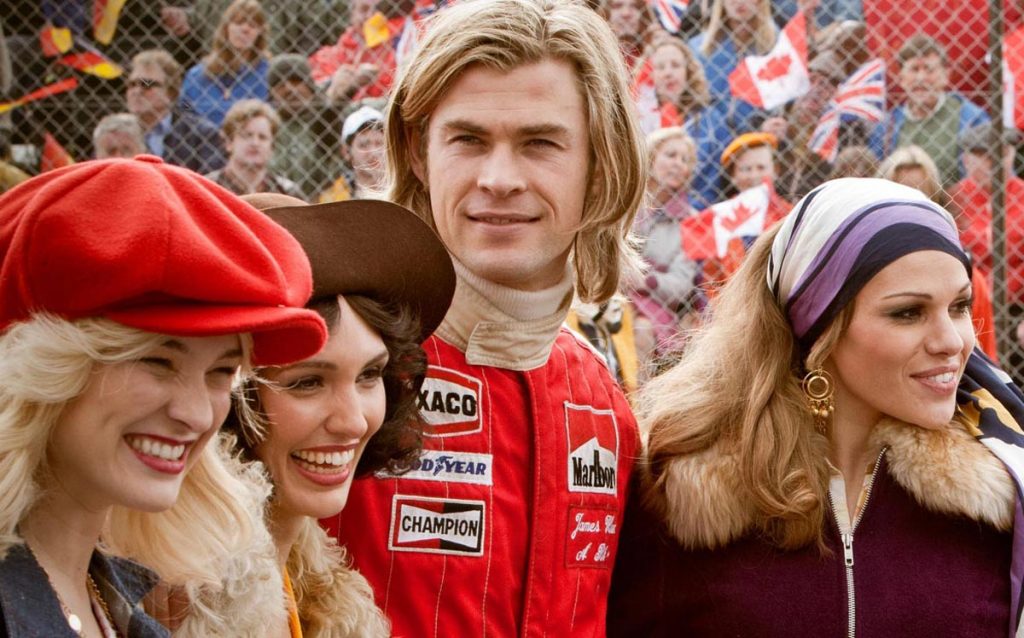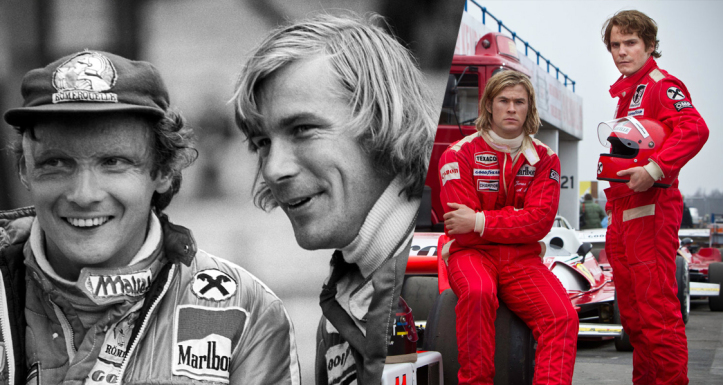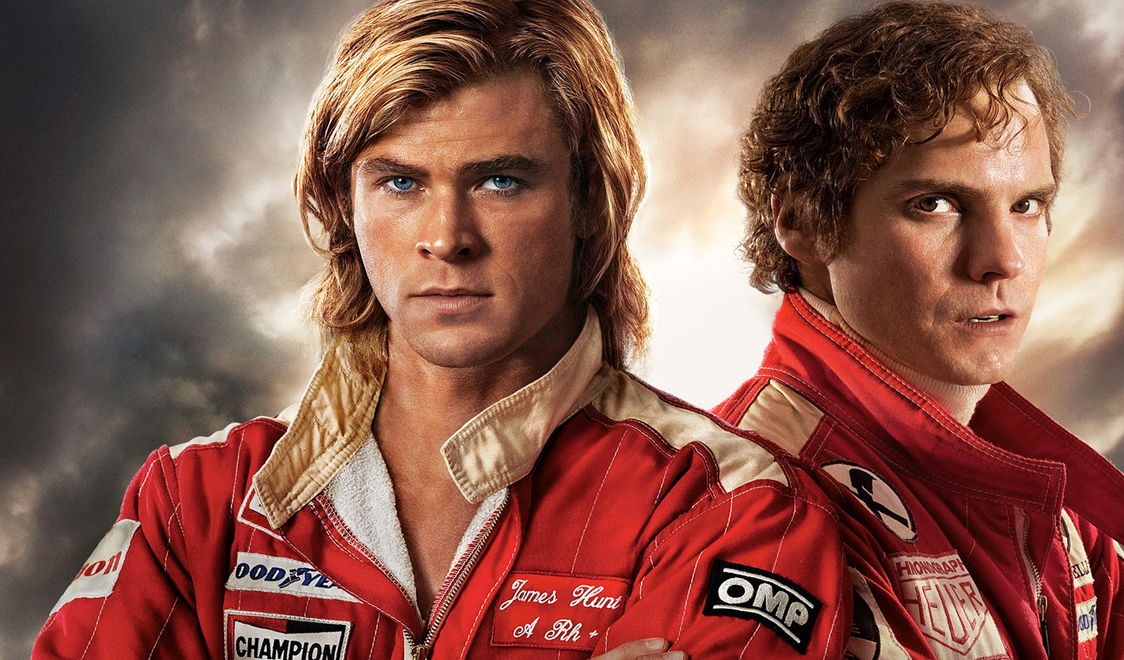“A wise man learns more from his enemies than a fool from his friends.” A phrase that defined the rivalry shared by the most celebrated Formula1 racers of the 1970s- James Hunt and Niki Lauda. Rush, is a story about two men with contrasting personalities and philosophies in life. Its portrayal of the immense depth in each character, and their individualistic perspectives, and ideals forms the very essence of this story. Niki Lauda- An Impassioned, disciplined, and dedicated racer determined to win the Grand Prix Championship. His sharp attention to detail, precisely calculated strategies and the stint of arrogance over his ability to achieve perfection are depicted through several nuances and elements. In many brief scenes we see him working on the science involved in building cars that meet his standards of maximum attainable efficiency. There’s a point when Ferrari (who at that point made the best cars) signs him and after taking their best car for a test ride he says “It’s terrible. Drives like a pig! It’s a shit box! It understeers like crazy and the weight distribution is a disaster. It’s amazing, all these facilities and you make a piece of crap like this.”
Niki Lauda- An Impassioned, disciplined, and dedicated racer determined to win the Grand Prix Championship. His sharp attention to detail, precisely calculated strategies and the stint of arrogance over his ability to achieve perfection are depicted through several nuances and elements. In many brief scenes we see him working on the science involved in building cars that meet his standards of maximum attainable efficiency. There’s a point when Ferrari (who at that point made the best cars) signs him and after taking their best car for a test ride he says “It’s terrible. Drives like a pig! It’s a shit box! It understeers like crazy and the weight distribution is a disaster. It’s amazing, all these facilities and you make a piece of crap like this.”
James Hunt on the other hand, a pompous man who carried himself with such frivolity was a heartthrob of the ladies and a superstar of the racing business. However, he was also a living personification of raw talent, aggression and an almost maniacal sort of energy to be the best. He persistently laid stress on how the best part about racing was his closeness to death which gave him that rush, and how he would put his life on the line any day in order to win. This aspect was what brought about a stark difference between the two characters.  The Grand Prix season of 1976 had been an engaging battle between James, who sought redemption of the title he had lost to Niki the previous year, and Niki, who pursued to defend his title to prove once and for all that he was the better one. It was August 1st at Nurburgring, the world’s most dangerous circuit, also known as The Graveyard, when weather conditions were at their worst making the track absolutely unsafe to race. Despite several attempts by Niki to cancel this race due to the sheer threat to life, the other teams didn’t agree as they were swayed by James for whom every single race counted. During that very race in an unfortunate event Niki’s car malfunctioned, and crashed. He had got into an accident which burnt his forehead and had to be admitted into the hospital.
The Grand Prix season of 1976 had been an engaging battle between James, who sought redemption of the title he had lost to Niki the previous year, and Niki, who pursued to defend his title to prove once and for all that he was the better one. It was August 1st at Nurburgring, the world’s most dangerous circuit, also known as The Graveyard, when weather conditions were at their worst making the track absolutely unsafe to race. Despite several attempts by Niki to cancel this race due to the sheer threat to life, the other teams didn’t agree as they were swayed by James for whom every single race counted. During that very race in an unfortunate event Niki’s car malfunctioned, and crashed. He had got into an accident which burnt his forehead and had to be admitted into the hospital.
This marked the juncture which shed light on a different side to James who regretted his use of cheap tactics, and felt responsible for Niki’s mishap. His constant efforts to write a letter to his opponent while he was in the hospital, and how he confronted him on the day of his return with an apology, shows that despite their professional strife, he didn’t hold anything personal towards the other. The same was found with Niki Lauda when he said “…yes you were responsible. But trust me, watching you win those races while I was fighting for my life, you were equally responsible for getting me back in the car.” James later went on to win the Grand Prix Championship of 1976. In the end there is brief encounter between the two, post the season, where Niki iterates to James how it was a blessing to have him as a rival, ‘cause that’s what made him better at what he did and he wished for James to get back to work, practice hard and continue to play that part. James like always in his nonchalant attitude says “…I will Niki, but I intend to enjoy a little first. Some of the life needs to be for pleasure. What’s the point of having a million cups and medals if you don’t have any fun? How is that winning?” It was this final conversation which left us with two completely distinctive stand points, yet both equally right. As the two bid adieu to each other and us, there was a small monologue by Niki who in his own words shared his relationship with James.
James later went on to win the Grand Prix Championship of 1976. In the end there is brief encounter between the two, post the season, where Niki iterates to James how it was a blessing to have him as a rival, ‘cause that’s what made him better at what he did and he wished for James to get back to work, practice hard and continue to play that part. James like always in his nonchalant attitude says “…I will Niki, but I intend to enjoy a little first. Some of the life needs to be for pleasure. What’s the point of having a million cups and medals if you don’t have any fun? How is that winning?” It was this final conversation which left us with two completely distinctive stand points, yet both equally right. As the two bid adieu to each other and us, there was a small monologue by Niki who in his own words shared his relationship with James.
“Of course he didn’t listen to me. For James one world title was enough. He had proved what he needed to prove. To himself and to anyone that doubted him. Three years later he retired. When I saw him next in London seven years later, me as champion again, and he as a broadcaster, he was barefoot on a bicycle with a flat tyre. Still living each day like his last. When I heard he died aged 45 of a heart attack, I was not surprised. I was just sad. People always thought of us as rivals, but he was among the very few I liked, and even fewer that I respected. He remains the only person I envied.”
It was at that one moment which changed the complete tone of the story. Two of the fiercest competitors of that era exemplified the true meaning of sportsmanship. It was beauty beyond words that could possibly never describe precisely the emotions it stirred and the message it conveyed.

